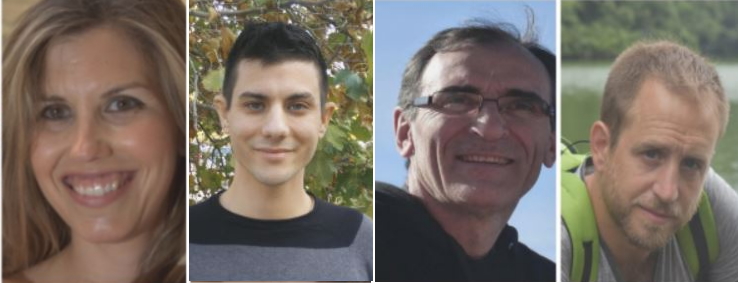
Bsicos group researchers, from the I3A (Engineering Research Institute) of the University of Zaragoza and CIBER-BBN), Dr. Jesús Lázaro, Dr. Eduardo Gil, Dr. Raquel Bailón and Dr. Pablo Laguna, are working on a line of work for the search of solutions for the early diagnosis of Covid-19 cases, through the development of an App for mobile phones.
For almost three years, Dr. Jesús Lázaro, under the supervision of Professor Pablo Laguna, from the resarch group Bsicos, which coordinate Nanbiosis U27 High Performance Computing , have been working on the European project WECARMON (Wearable Cardiorespiratory Monitor) for the development of an ambulatory system that would allow monitoring the cardiac and respiratory rhythm of patients with Clinical Obstructive Pulmonary Disease (COPD) and thus control and predict episodes of worsening of the disease.
However, the current situation of pandemic due to the SARS-CoV-2 coronavirus has led the researchers, with the approval of the European Commission, to temporarily redirect their objective, foccusing their work in search of solutions for the early diagnosis of the covid-19.
The work carried out for patients with a respiratory disease such as COPD could now serve for the early detection of people with symptoms of covid-19, before even having fever, but also for asymptomatic people, since the rapid variation of these parameters is known. in the initial stages of other respiratory conditions. Our researchers will use these cardiac and respiratory parameters, indirect markers of the autonomic nervous system and, therefore, sensitive to the response of the immune system, potentially helping to identify possible cases of covid-19 earlier. A technological tool that could join the fight to control this pandemic.
Jesús Lázaro has recently made a two-year stay at Connecticut University in the United States, partner of the WECARMON project in which he was working with Pablo Laguna. Two other researchers from the Bsicos group, Dr. Raquel Bailón and Dr. Eduardo Gil, have also decided to redirect their lines of research and focus on the SARS-CoV-2 coronavirus. Re-directing research lines with different objectives to join the fight against the coronavirus is a great challenge and shows the relenvance of cutting-edge research to provide answers to the arising challenges in our society.
Jesús Lázaro explains that the application they are working on would allow a pre-selection of people at risk by analysing markers of the autonomic nervous system that would be measured on a mobile phone. ” At this moment, the above-mentioned four researchers have already developed the algorithms for other platforms and they are working now on an App using the technology of the cameras and the flashlight of the mobiles. A sudden change in heart rate variability or an increase in respiratory rate could give a sensitive and early warning, to resort to other more specific diagnostic tests for covid-19, decreasing the latency time, which has been sadly shown key in this pandemic. The developments and validation, those already made and those planned, are being carried out using NANBIOSIS U27 High Performance Computing (I3A-Unizar/ CIBER-BBN)
The WECARMON project is funded by the H2020 Research and Innovation Program of the European Commission. It is part of the Marie Sklodowska-Curie Individual Actions, whose objective is to promote the professional career of young and brilliant researchers, expanding their knowledge through training, stays abroad and internships, in order to help them develop all their potential as researchers.
Related news:








